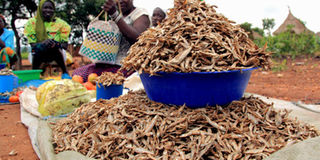Researchers turn to fish by-products for better nutrition

Nutritious. A woman displays silver fish for sale during a market day in Yumbe District. PHOTO BY RACHEL MABALA
A collaborative team of researchers have launched a project that seeks to increase the consumption of small fish and fish by-products in the country.
Dubbed ‘harnessing dietary nutrients of under-utilised fish and fish processing by-products to reduce micro-nutrients deficiencies in Uganda’, researchers from Makerere University, National Fisheries Resources Research Institute (NaFIRRI), McGill University, Canada and some private sector players seek to use fish to tame malnutrition estimated at 53 per cent among children.
“Fish is a key source of micro-nutrients. Despite this, [big] fish stocks are on the decline but small fish are abundant,” Dr Jackson Efitre, a senior researcher from Makerere University and principal researcher of the project, said yesterday in Kampala.
He said the decline in big fish species such as the Nile Perch, tilapia, among others, is attributed to the increased fish exports, poor fishing methods and poor post-harvest handling methods.
Researchers are now turning to small species such as miziri and ragogi, mainly in Lake Albert, mukene in Lake Victoria, Kyoga and Nabugabo and frames of processed big fish species to come up with nutritious food products to address malnutrition.
Mr Philip Borel, a member of the Uganda Fish Processors and Exporters Association, estimated that factories produce up to 17,000 tonnes of fish by-products such as heads and frames, which are exported mainly to the DR Congo.
Dr Anthony Taabu Munyaho, the director of NaFIRRI, said the project, funded by Cultivate Africa’s Future Fund programme and International Development Research Centre at Can$2.5m (about Shs7b), is timely.
Dr Munyaho said the three-year project, will help researchers know the small fish stocks in the said three lakes, carry out research on fish nutritional value, market fish products and also come up with best models to sustainably manage small fish stocks.
“We want to get the value and quantity in the lakes and then we come up with the best models of managing fish stocks,” he said.
Dr Esther Babirekere, from Mulago hospital’s Mwana Mugimu nutrition section, applauded the project, saying if well implemented, it will help mothers and their children to get nutrients filled foods.
“Fish contains nutrients such as zinc, calcium…good for the development of the baby,” she said yesterday.
in Kampala.
Malnutrition
Statistics. Finance Minister Matia Kasaija during the budget speech two weeks ago said 53 per cent of Ugandan children under five years “are malnourished and hence anaemic, and 29 per cent of them are stunted or wasted”
“Many women of reproductive age are also malnourished, with 32 per cent of them being anaemic,” he said.



